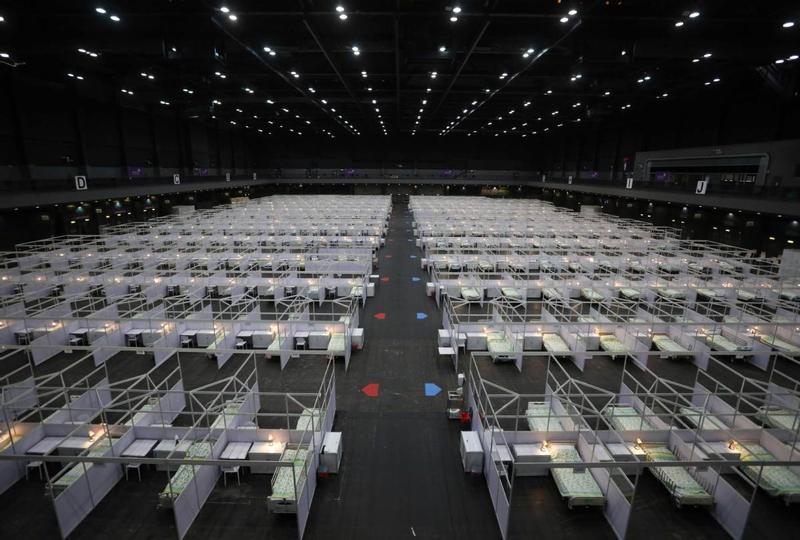 Hong Kong's first makeshift hospital opens it doors on Aug 1, 2020, at AsiaWorld-Expo exhibition center near Hong Kong International Airport. (CALVIN NG / CHINA DAILY)
Hong Kong's first makeshift hospital opens it doors on Aug 1, 2020, at AsiaWorld-Expo exhibition center near Hong Kong International Airport. (CALVIN NG / CHINA DAILY)
Chinese mainland medical experts sent to the Hong Kong Special Administrative Region to assist the fight against the COVID-19 epidemic will incorporate experiences gained on the mainland with on-the-ground situation in Hong Kong while respecting local medical regulations and legal provisions.
Wan added that upon arrival, their work will cover a wide range of aspects, including the layout of facilities, allocation and training of personnel, design of working procedures and proper disposal of medical waste
To help curb a resurgence of the virus in Hong Kong, the National Health Commission said on Saturday that it had gathered two medical assistance teams — one aimed at boosting local testing capacity and the other one focusing on helping manage temporary treatment centers, known as fangcang hospitals or cabin hospital.
READ MORE: Mainland medical team arrives to help HK fight epidemic
Wan Jun, vice-president of Renmin Hospital of Wuhan University in Wuhan, Hubei province, is a member of the six-member group devoted to helping build fangcang hospitals. He said in an interview with the China Central Television on Sunday before leaving for Hong Kong that before departure, the team had sorted out experiences learned during the epidemic in Wuhan — the hardest-hit city in China, enhanced skills of team members, stocked up on protective equipment and learned about healthcare rules in Hong Kong.
"We will bring the care of the central leadership and people on the mainland to people in Hong Kong and provide professional guidance and knowledge. Meanwhile, we will uphold the principle of 'one country, two systems' and abide by local rules and regulations," he said.
ALSO READ: Residents thank central government for support
The first fangcang hospital in Hong Kong, converted from the AsiaWorld-Expo exhibition center, went into operation on Saturday, according to the Hong Kong government. As of Sunday, the mainland team had received the center's floor layout and was working on preparations.
Wan added that upon arrival, their work will cover a wide range of aspects, including the layout of facilities, allocation and training of personnel, design of working procedures and proper disposal of medical waste.
During the peak of the epidemic on the Chinese mainland, Wan was also the head of the Wuchang fangcang hospital in Wuhan, which received over 1,100 patients.
"Having experienced the construction and management of fangcang hospitals from scratch and having seen the positive effects, we will share standardized procedures and practical experiences with colleagues in Hong Kong," he said.
Ma Yonggang, another member of the medical aid team, said one crucial task in Hong Kong is to prevent hospital-acquired infections through careful design and precautions.
Since Hong Kong mainly speaks Cantonese, Ma added that smart device will be deployed to facilitate communication.


